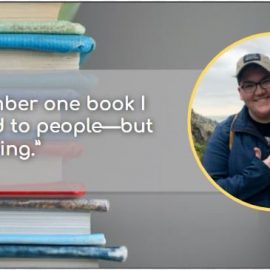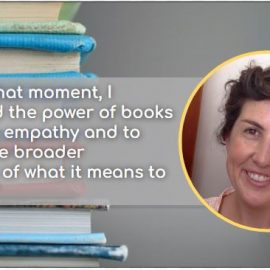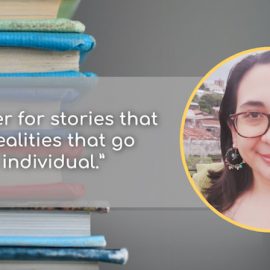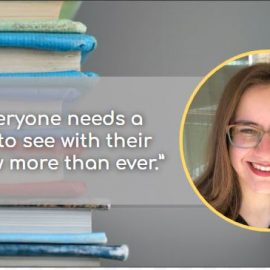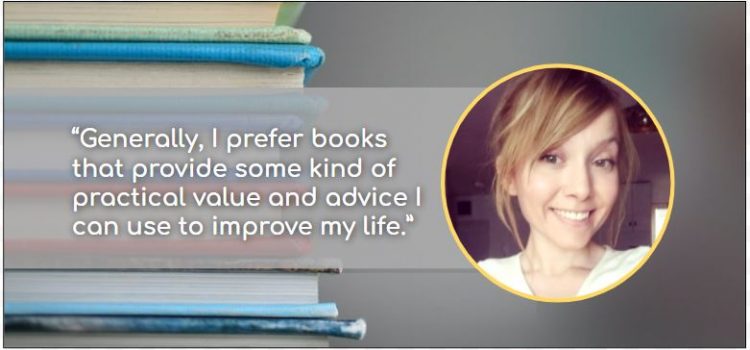
What series does Darya return to every couple of years? What genre does she prefer to read?
Darya is part of Shortform’s marketing team and works as an SEO writer, creating and editing material for the Shortform blog. As a reader, Darya prefers educational books that offer practical, actionable advice she can implement right away.
Our Interview With Darya
Here’s what Darya had to say about her favorite book series, authors, and more.
What are you reading these days?
Lately, I’ve been really into books about health and nutrition. I want to optimize the way I eat and design a realistic lifetime eating plan I can stick to. So, I got a few reads that discuss the science of healthy eating. The most recent book I’ve read is the Grain Brain by neurologist David Perlmutter. The key premise is how to eat for optimal brain health and to ward off neurological diseases of old age. Currently, I’m reading The Longevity Diet by Valter Logo, which is about what to eat to maximize your healthy lifespan.
I’m not sure what I’m gonna read next. I’ve got my eyes on a few books from Shortform’s library actually: In Defense of Food by Michael Pollan and The Plant Paradox by Steven Gundry. I’ve also been wanting to read Homo Deus: A Brief History of Tomorrow by Yuval Noah Harari. I did some blogging work for this book and was intrigued, so I got the full book but haven’t gotten around to reading it yet.
If you could have a dinner party with any three authors—dead or alive—who would they be and why?
I can think of only one I would like to talk to: Andreas Moritz. I trust his knowledge about anything to do with health and diet.
What’s your favorite genre?
I don’t really have a favorite genre. Generally, I prefer books that provide some kind of practical value and advice I can use to improve my life. For example, I like reading books about healthy eating, exercise, and pop psychology.
Are there any book genres or tropes that you dislike or refuse to read?
I don’t like comics—never understood why people read them, especially adults.
I also don’t like any books that prescribe certain values or tell you how to behave without a sound basis in logic and/or science. Or books that offer questionable, overly simplistic advice like you’d find in popular books like The Secret and The Law of Attraction. For example, manifesting your desires with your thoughts, trusting some “Higher Power,” opening your chakras—things like that.
What’s your favorite way to read a book?
I normally get physical books and read before bedtime. I spend a lot of time in front of screens working and playing games, and physical books provide some respite from that. I also like the visceral feeling of holding a book, turning pages, and the smell of paper.
Who is your favorite author?
J. R. R. Tolkien—he makes scenes really come alive in your mind. I get so immersed in his writing, often losing track of time. He is indeed a great author and storyteller. I admire his imagination and genius for inventing such an elaborate yet consistent world. I mean, he even created a detailed map of the Middle Earth, genealogy trees going back generations, and the Elven language!
How have your reading tastes changed over the years?
I used to like reading fiction, but I stopped a few years ago. Somehow, I don’t find the act of reading itself very pleasurable anymore, so I rarely read for aesthetic reasons anymore. I read for information—mostly news and practical educational material.
I’m not sure why I just stopped reading fiction. I used to read a lot of it as a child—lots of adventure fantasy and science fiction. Thinking about it, the time when I stopped reading coincided with the time I moved to another country, and books in my native language weren’t so easy to find—perhaps that was a contributing factor.
Was there a specific book that sparked your love of reading?
The Lord of the Rings and the Harry Potter series.
Do you have any guilty pleasure books?
I come back to read the Harry Potter series every two years or so.
What’s an interesting fact that you learned from a book recently?
Apparently, white rice is better for you than brown rice—I learned it from The Plant Paradox. The common wisdom is that brown rice is better for you because it has more fiber and because it doesn’t spike your blood sugar as much as white rice does. However, white rice has fewer lectins, whose consumption is associated with many chronic diseases such as obesity, chronic inflammation, and autoimmune diseases.
Have any books you’ve read caused you to make any life changes or to change or develop any habits?
After reading Timeless Secrets of Health and Rejuvenation by Andreas Moritz, I reduced my consumption of foods containing gluten.
What’s your favorite quote from a book or an author?
I’ve been re-reading Harry Potter recently, and this quote by Albus Dumbledore struck a chord with me: “Youth can not know how age thinks and feels, but old men are guilty if they forget what it is to be young.” I’ve been thinking something along the same lines—how people at different stages of life live in vastly different worlds.
What are your favorite book adaptations?
The Lord of the Rings—because the movie actually got me to read the books, and I absolutely loved it. I think I wouldn’t have enjoyed reading the books as much if I hadn’t watched the movie beforehand. Having the representations of the characters in my mind really enhanced my reading experience.
Are there any lesser-known books that you’ve read that you want others to know exist?
The Wisdom of the Enneagram by Don Richard Riso. As cheesy as it may sound, I think this is the best book you could read for finding out who you really are. Enneagram is a personality framework that categorizes nine types of personalities and explores the key traits, fears, and coping mechanisms of each. Some say Enneagram is pseudo-science because there’s limited research on the instrument’s validity and reliability, but I still really like it just because of how accurate it was in describing my personality. It is, by far, my most favorite self-help book.
At Shortform, how do you go about working on a book that has viewpoints you don’t agree with?
I make sure to indicate the viewpoint belongs to the author.
Are there any books you had to read for Shortform that you thought you wouldn’t like and ended up loving?
I don’t normally enjoy reading spiritual books such as The Secret—I think there’s too much fluff, and the advice is often too obscure and simplistic. However, I quite liked The Untethered Soul: The Journey Beyond Yourself by Michael Alan Singer. I actually listened to the audiobook while commuting and walking places and found it very calming—it reminded me of Alan Watts’s lectures.
What are your favorite books in the Shortform library?
How Not to Die, In Defense of Food, and The China Study. They’re good books on health and nutrition offering very clear and to-the-point explanations and eating advice that’s grounded in research. I’ve read their summaries and really appreciated the critical commentary provided by Shortform.
Darya’s Recommended Books
- The Harry Potter series by J.K. Rowling
- The Lord of the Rings trilogy by J. R. R. Tolkien
- The Wisdom of the Enneagram by Don Richard Riso
- How Not to Die by Gene Stone and Michael Greger
- In Defense of Food by Michael Pollan
- Timeless Secrets of Health and Rejuvenation by Andreas Moritz
About the Series
Here at Shortform, we want to give our employees names and faces so you can get to know the people who make the magic happen. That’s why we’re doing this series where we interview our employees and share their thoughts and opinions. You can check out more employee interviews here.

